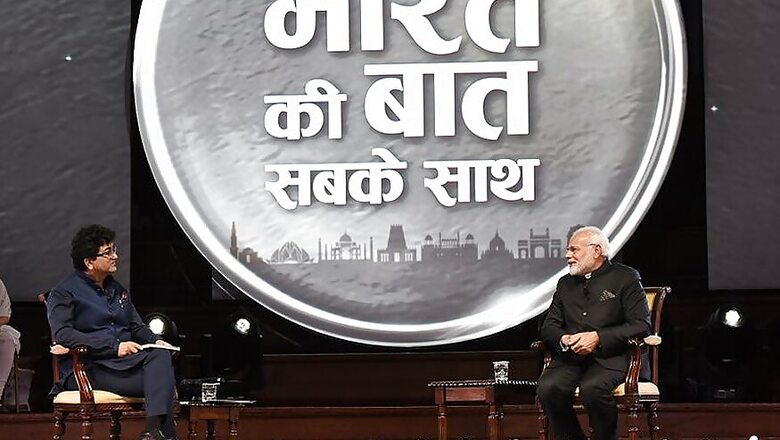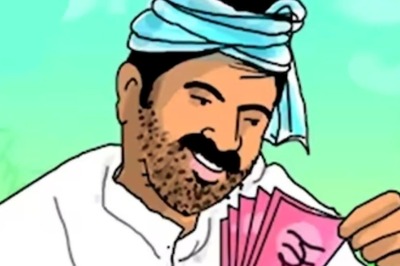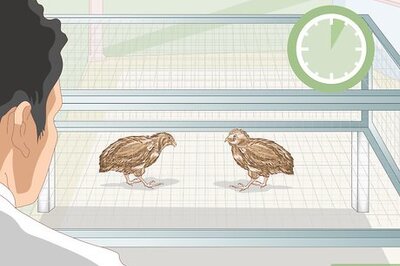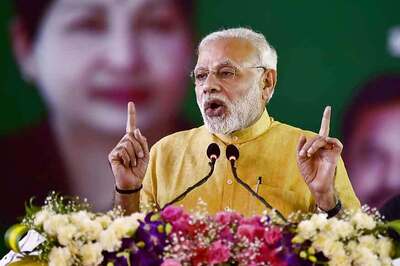
views
New Delhi: Publicists, especially when running short of talking points to broadcast because negatives have created adequate din, are left with little option but to dig into archives.
To begin with, the choice of Prasoon Joshi as host for 'Bharat Ki Baat, Sabke Saath', was not a very smart decision. Inappropriate, because he was part of the Bharatiya Janata Party's 2014 campaign, thereby carrying the self-limiting tag of 'in-house' anchor. In the absence of neutrality, events of this nature get restricted to the already converted.
Additionally, Joshi is also the country's censor board chief now making his selection even more unsuitable because it opened up Modi to the charge of being a control-freak especially in — and of — the media.
The London event thereby was one 'of the believer, by the believer and for the believer'. The political challenge is not just to regain what has possibly been lost from the 31 percent vote base in the last four years, especially post-August 2017, but to add to it. This was not addressed.
This could have been attempted by setting up a semblance of a contest. Instead, planners devised the event as a 'friendly match', with the outcome being known to everyone — and they all went back smiling! Consequently, an opportunity had been lost.
Moreover, what has become passé became the entry point to the talk — that Modi's life "began on the railway platform".
There is a saying in most Indian languages: “If you squeeze a lemon too hard, the juice turns bitter”. No doubt the opportunity gifted by Mani Shankar Aiyer — the first time — was rightly milked in 2014.
But, as incumbent, when Modi faces the daunting task of establishing promises as being fulfilled and of being the transformative leader that he was anticipated to be, does his personal background matter?
Will Modi's poverty, the hardships his parents — especially mother — faced, provide solace to the proverbial last man who still remains at the end of the queue and with little additional in hand?
Doubtful, because this sort of campaign does not tackle perception to the contrary.
But when Modi came back to this later, stating critics in 2014 said a chaiwala would be a failure in diplomacy, it sounded worse than being tad repetitive. More so, as the vital question was on the space he envisioned for India in the new world.
The answer was typical Modispeak — with another question: Don't you feel more power in the Indian passport when you show it now? No one voiced concerns about the country's neighbourhood policy and the 'greater space' China has secured in South Asia. Possibly because it was decided that there is yet no answer to this awkward query.
Falling back on old analogies did not do Modi any good. His ‘glass half full’ correlation stirred not just students of SRCC in 2013 when every word he spoke had newness, but using it again draws a gnawing thought of him having run out of expressions.
Similarly, is there little to gain from reminding people of having created the idea of ‘Divyang’ for a differently-abled person. Likewise, it is time to understand that the impact of labelling himself as 'sevak' (servant) in a strategy drawn from Nehru's book, evokes little positives anymore. Every claim and coinage has a shelf-life and Modi is possibly mouthing phrases whose 'best before' date is long past.
This was an interaction in London but the audience was the voter at home. It should, though, worry him that while he previously didn't allow anyone to anticipate his next line, in this interaction there was an element of predictability throughout the two-hour-plus event.
"Rape is rape, shouldn't be politicised," he said. Modi forgot or chose not to remember, the horrific December 16, 2012, incident which possibly was the last nail in the UPA coffin. Channels which have been replaying then angry statements by his women ministers juxtaposed with their silence post-Kathua and Unnao.
One would have liked a more combative Modi. What we saw was a defensive premier who has decided that it was best to sit on past laurels and remind people only about them. Talk surgical strikes, tell people you flexed muscles to the extent that it scared a Pakistani general from picking up the telephone but sidestep Doklam.
Modi declared he does not shy away from criticism but no question was anything but sycophantic — even Joshi's posers. While no one expected him to do an Oriana Fallaci but Joshi could at least have displayed more bite, even if only for the event's credibility. News anchors close to the establishment are likely to have sported a jaguar's smile at the end of the telecast.
Impatience cost Modi variously over the past four years. In 2014, he told people they gave Congress 60 years, forgetting the six to the NDA regime under Atal Bihari Vajpayee, another three years of Janata rule in which the Jana Sangh was a part and one year when VP Singh was PM with BJP’s support. As payback, Modi asked for sixty months which he got. But people were not willing to wait for sixty days. They wanted immediate results because they pressed the 'send' button in April-May 2014.
The smart politician that he is, Modi wisely did not deny the existence of impatience and instead depicted it as a positive trait. Shrewdly, he argued that people were impatient only with those they expected to deliver. This cheered the house but the discourse has to move beyond platitudes. Growing edginess bordering on annoyance may cost electorally.
Criticism has disappeared he said and in a veiled manner stated that the media levelled allegations only due to its 24x7 competitive rush. He said research was not being adequately done. This is true for the other side too, fact-checkers flourish on the Internet and function with an impartiality that Modi does not think free media is committed to.
It surely is a coincidence then that he said people would even be scrutinising 'Bharat Ki Baat, Sabke Saath'. Once asked, I had to watch the show in its entirety.
Someone must tell him that like the child in Hans Christian Andersen's Fairy Tales, none of this is likely to work. In 2014, when there was curiosity about Brand Modi, this may have worked. The publicity script for the next round will possibly have to be different.
The million dollar question, in a party which has sycophancy embedded at the top, is — who will bell the cat?
(The author is a Delhi-based writer and journalist. He tweets at @NilanjanUdwin. Views are personal)




















Comments
0 comment